Refrigerator Only Cools To 50 Degrees? Swift Fixes
We may earn affiliate fees for purchases using our links (at no additional cost to you).
Is your refrigerator only cooling to 50 degrees?
Worried about your perishables going bad? Discover the reasons behind this cooling conundrum and learn how to troubleshoot the issue.
Our article will explore the common causes and potential solutions for refrigerator b.
Say goodbye to lukewarm temperatures and hello to crisp, refreshing coolness.

Why Is Your Refrigerator Only Cooling to 50 Degrees?
There are several reasons why your refrigerator is only cooling down to 50 degrees Fahrenheit.
Clogged Condenser Coils:
In a refrigerator, dirty condenser coils can’t effectively release heat. This hampers the cooling process and can cause your fridge to cool inadequately.
Find the condenser coils underneath or at the back of your refrigerator to address this issue.
Use a vacuum cleaner or a brush to remove any accumulated dirt or debris. This simple step can help improve the cooling efficiency of your refrigerator.
Faulty Evaporator Fan:
The evaporator fan is responsible for circulating cold air throughout your refrigerator. If the fan malfunctions or stops working altogether, it can lead to inadequate cooling.
Listen for the sound of the evaporator fan running in your refrigerator’s freezer compartment.
If you don’t hear any noise, it might indicate a faulty fan motor. In such cases, you may need to replace the evaporator fan motor to restore proper cooling.
Damaged Door Gaskets:
Keeping your refrigerator airtight requires rubber seals around its doors, known as door gaskets.
Damaged door gaskets allow warm air to seep into the refrigerator, making cooling difficult.
To inspect the door gaskets, visually check for any signs of wear, tears, or gaps. Check for damaged gaskets and replace them to ensure a tight seal.
Faulty Temperature Control Thermostat:
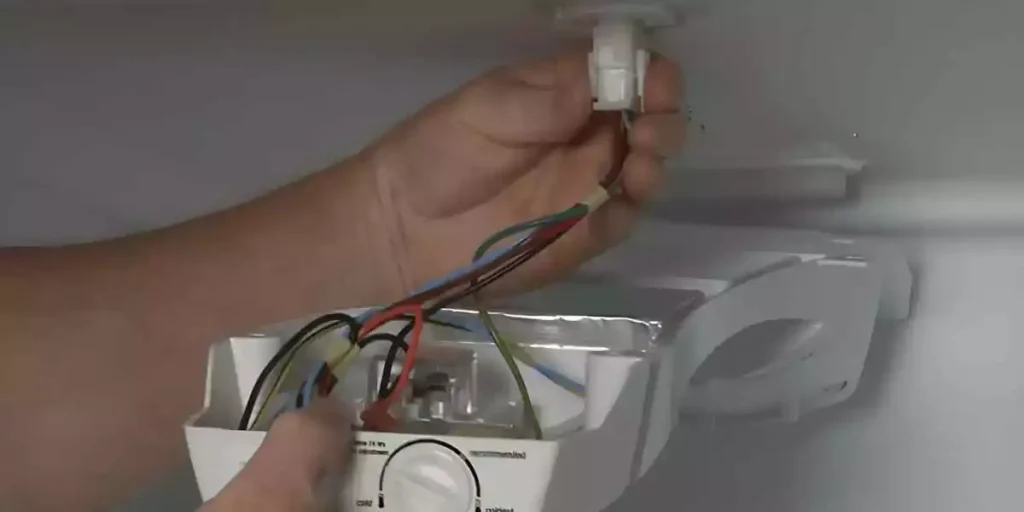
The temperature control thermostat is responsible for regulating the cooling cycle of your refrigerator.
The cooling system may not engage or turn off if it malfunctions. This can result in inconsistent cooling or a failure to reach the desired temperature.
Try turning the thermostat to the coldest setting and listening for a click. If you don’t hear the click, it could indicate a faulty thermostat that needs to be replaced.
Insufficient Refrigerant:
Refrigerants absorb and expel heat from the air inside refrigerators. Your refrigerator can lose cooling efficiency if refrigerant leaks or levels are low.
To diagnose and fix refrigerant issues, you should contact a certified technician. They can locate any leaks, repair them, and recharge the refrigerant to the appropriate levels.
Faulty Compressor:
In a refrigeration system, the compressor compresses and circulates refrigerant. Inadequate cooling can result from faulty compressors.
The compressor may sound unusual, hum, or feel hot to the touch if it makes unusual noises.
The compressor should be repaired or replaced by a professional if necessary.
Other Possible Causes:
There can be additional factors contributing to your refrigerator cooling inadequately.
An overloaded refrigerator blocked vents, and incorrect temperatures can obstruct airflow.
Try adjusting the temperature settings to see if it improves cooling performance. Consult a professional technician if the problem persists.
Potential Issues with the Evaporator Coils and Condenser Fan
Here are practical steps to troubleshoot common issues with evaporator coils and condenser fans.
Evaporator Coil Problems
Frozen Coils:
Your air conditioning system may not be cooling properly if the evaporator coils are frozen. This occurs when the coils become excessively cold, leading to ice formation.
To troubleshoot this issue, first, turn off your AC system and allow the coils to thaw. Filters that are clogged restrict airflow and contribute to freezing.
Check for refrigerant leaks or improper refrigerant levels if the problem persists.
Coil Corrosion:
Over time, evaporator coils can suffer from corrosion, especially in humid environments.
Refrigerant leaks can result from corrosion-weakening coils. Regularly inspect your coils for signs of corrosion, such as rust or discoloration.
To determine if coil replacement is necessary, consult an HVAC technician.
Condenser Fan Issues
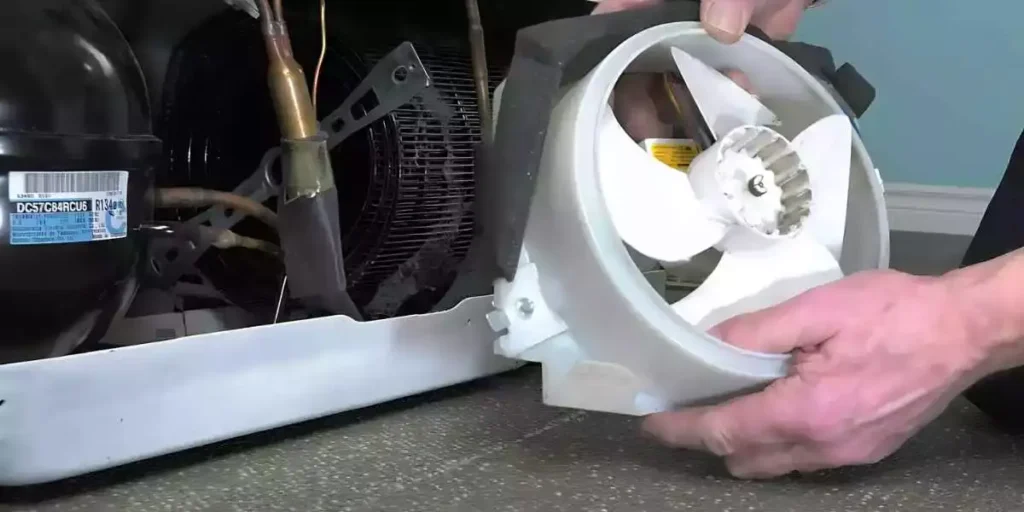
Fan Motor Failure:
To release heat from your AC, the condenser fan motor circulates air across the coils. Overheating can occur if the fan motor malfunctions.
Condenser unit noises or vibrations may indicate a failing motor. If you suspect a motor issue, turn off the power and inspect the motor for any signs of damage.
If necessary, replace the motor with an HVAC professional.
Fan Blade Damage:
The airflow can be disrupted by damaged or bent fan blades, reducing cooling efficiency.
Regularly inspect the fan blades for any signs of wear, cracks, or misalignment. Replace damaged blades or seek professional assistance if you notice any problems.
Lack of Maintenance:
A clogged condenser fan can cause a buildup of dirt, debris, and grime. Remove any accumulated debris from the condenser unit and keep the area around it clean.
To ensure optimal performance, an HVAC technician should clean and inspect the fan regularly.
How to Troubleshoot and Fix Refrigerator Cooling Problems?
Here are the most common refrigerator cooling problems and their solutions.
Step 1: Power supply check
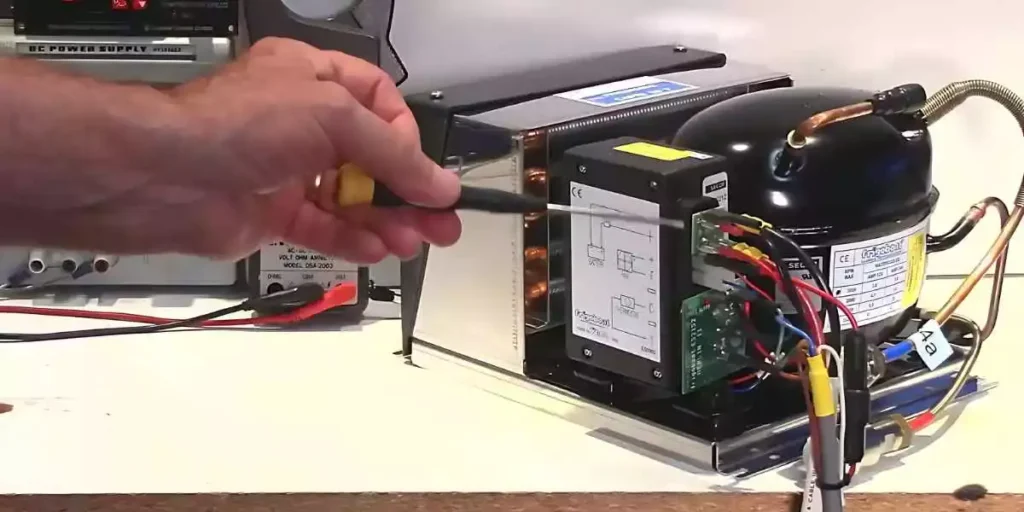
Plug the refrigerator into a functioning outlet. Verify that the power cord is securely connected to both the outlet and the refrigerator.
If the fridge is not receiving power, it won’t cool properly. Try plugging another device into the same outlet to ensure it is working.
Step 2: Adjust the Thermostat Settings
Inspect the thermostat settings on your refrigerator. Ensure that the temperature is set to the desired level for cooling.
Too high or too low a temperature can affect cooling performance. Set the fridge’s thermostat accordingly and allow it time to adjust.
Step 3: Maintain a clean condenser coil
Locate the condenser coils at the back or underneath your refrigerator. These coils can accumulate dust, dirt, and debris, hindering the cooling process.
Use a vacuum cleaner with a brush attachment or a soft brush to carefully clean the coils. This will enhance the fridge’s efficiency and cooling capability.
Step 4: Clear Obstructions in the Evaporator Fan
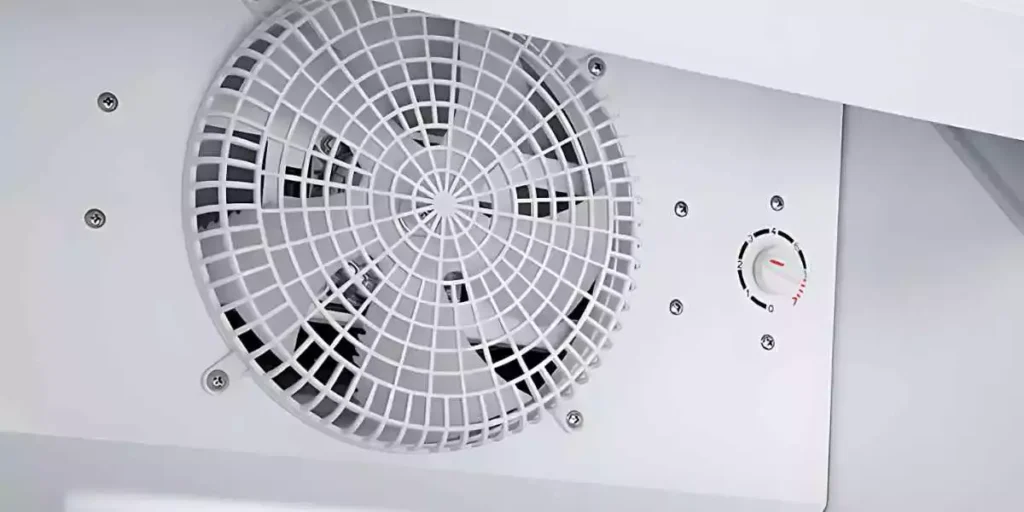
The evaporator fan is responsible for circulating the cool air inside the refrigerator. If it gets blocked or obstructed, it can disrupt the cooling process.
Remove any debris or objects preventing the fan from spinning freely. Ensure the fan blades are not damaged and are able to rotate smoothly.
Step 5: Check the Door Seals
A faulty door seal can lead to air leakage, causing inefficient cooling. Inspect the gaskets around the refrigerator door for any signs of wear, tears, or damage.
Close the door and check for any gaps or areas where the seal is not tight. If necessary, replace the door gasket to ensure a proper seal and efficient cooling.
Step 6: Examine the Evaporator Coils
The evaporator coils play a crucial role in cooling the refrigerator. If they are covered in frost or ice, it indicates a problem with the defrost system.
Once the ice has melted, unplug the refrigerator and clean the coils. A faulty defrost system may cause the coils to freeze again quickly.
Step 7: Verify the Air Vents
Blocked air vents can disrupt the airflow inside the refrigerator, leading to cooling issues.
Check the freezer and fresh food compartment air vents for obstructions. Clear any blockages and allow proper airflow for effective cooling.
Step 8: Evaluate the Condenser Fan
The condenser fan, usually located near the compressor, aids in cooling the refrigerant. If the fan is not working correctly, it can cause cooling problems.
When running the refrigerator, listen for any unusual noises coming from the fan. If the fan is not functioning, it may need to be replaced or repaired by a professional.
Step 9: Inspect the Refrigerant Levels
Low refrigerant levels can hamper the cooling performance of your refrigerator. It is best to leave checking and refilling refrigerant to qualified technicians.
Contact a professional if you suspect a refrigerant issue.
Step 10: Seek Professional Assistance
A professional is recommended if all the previous steps are not effective in cooling your refrigerator.
A qualified technician will be able to diagnose and fix more complex refrigerator cooling problems.
Factors That Can Impact Refrigerator Cooling Efficiency
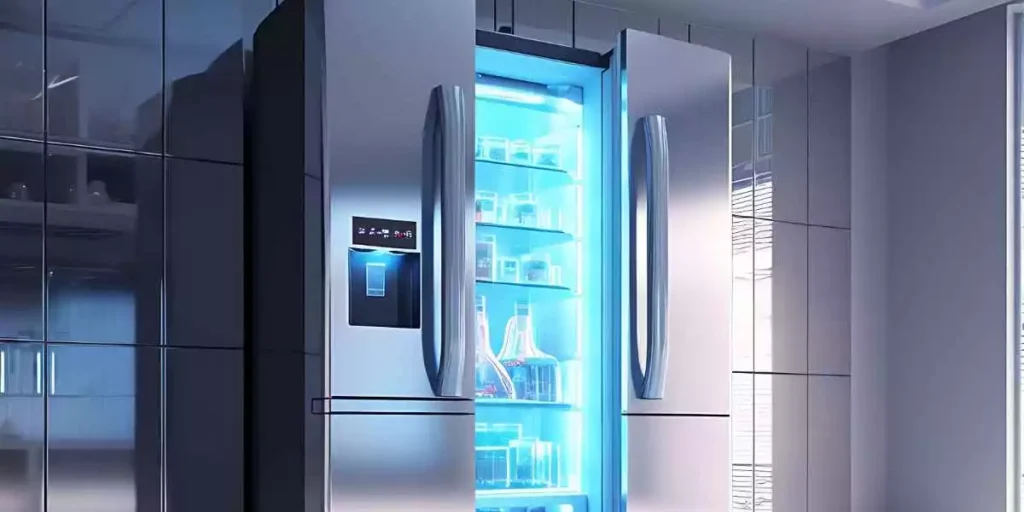
Several factors can impact the cooling efficiency of a refrigerator. Here are some of the key factors to consider:
Temperature setting:
The temperature at which you set your refrigerator can affect its cooling efficiency. Overheating can reduce compressor efficiency if the temperature is set too low.
If your food is safe and fresh, set it at the manufacturer’s recommended temperature.
Location:
The location of your refrigerator can impact its cooling efficiency. Avoid places with direct sunlight, ovens, or heaters that can cause the refrigerator to overheat.
As a result of heat exposure, the compressor works harder to maintain the temperature.
Door seal:
A proper seal on the refrigerator door is crucial for maintaining cooling efficiency. The compressor has to work harder if the door seal is worn out, damaged, or improperly closed.
Regularly check and clean the door seal to ensure it is in good condition and tightly closed.
Refrigerator age and maintenance:

Older refrigerators generally have lower energy efficiency compared to newer models.
As refrigerators age, their components can wear out, resulting in reduced cooling efficiency.
It is important to perform regular maintenance on the condenser coil, gaskets, and airflow.
Overloading and organization:
The compressor has to work harder when the refrigerator is overloaded with food. Ensure that there is enough space between items to allow for proper circulation of cold air.
Close the door as much as possible and make it easy to access the contents.
Energy efficiency rating:
When purchasing a new refrigerator, consider its energy efficiency rating. Energy Star models are designed to be more energy-efficient and can reduce electricity consumption.
Ambient temperature:
The ambient temperature of the room where the refrigerator is placed can affect its cooling efficiency.
The refrigerator’s compressor may have to work harder if the room temperature is high. To optimize cooling efficiency, place the refrigerator in a moderate room.
FAQs
Can Placing Warm Or Hot Food In The Refrigerator Affect Its Cooling Capability?
What Is The Trick To Getting My Refrigerator To Reach Below 50 Degrees?
Does The Age Of The Refrigerator Affect Its Cooling Performance?
Could A Low Refrigerant Level Be The Reason For My Refrigerator’s Inadequate Cooling?
Conclusion
Ensure optimal cooling efficiency for your refrigerator by considering key factors. Make sure the door seal is tight and organize items properly to allow for proper airflow.
A suitable ambient temperature and regular maintenance enhance performance. These measures can help you maintain the freshness and shelf life of your food in your refrigerator.